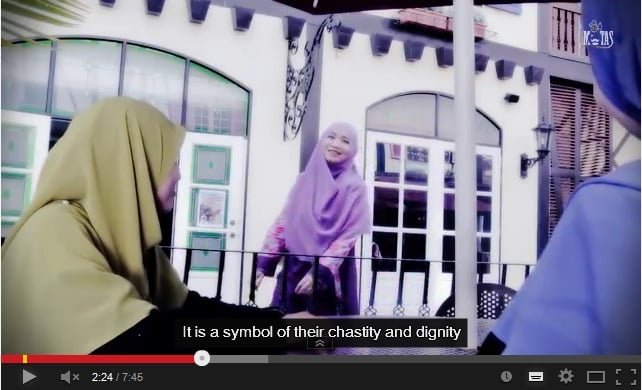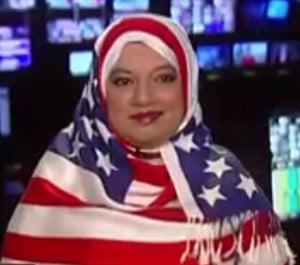
When I was 19 years old and just exiting from the rebellious teenage years, I stepped out of the house with my hijabi sister. I was newly de-jabbed (the first tentative attempt of many), and feeling awkward and – for lack of a better description – naked. My neighbour happened to step out at the same time, looked at the two of us, and proceeded to declare my sister the prettier of the two of us.
“Beautiful! Your sister looks so beautiful in hijab!” Embarrassed, I tried to disappear. Eventually I realise that it’s never a good idea to listen to men’s ideas about what women wear because guess what? On a scale of 1 to 10 of how much their opinions matter, it’s exactly zero.
We are often told that hijab protects us from harassment and the male gaze. What we were conveniently not told is that hijab comes with its own unique type of male gaze, which can make you squirm just as much.
A few years ago, Nicole dissected a similar hijab-being-promoted-by-a-man song ‘You Got It Covered’ with an overwhelming response from both sides. This year, I present to you a Malaysian boy band singing a cover (the video describes it as a parody) of One Direction’s pop hit ‘That’s What Makes You Beautiful’, called ‘Hijab Makes You Beautiful’.
The lyrics are a summary of all possible debates about hijab, of which we have discussed endlessly, so I won’t rehash them here. But the rap section of the song is particularly staggering in its obliviousness:
Muslim women wear hijab as a sign of modesty and purity / It is a symbol of their chastity and dignity / Good speech, manner, behaviour and appearance in public are what hijab to me
Not only just cover your hair and body / I’m sorry our women are too exclusive to be hold, to be seen
Cause they’re future mom / We will not let our women to be like an open sweet candy / Being exposed to dirty flies until gets filthy / We live in a world where some women are being paid to be naked, while other get fined for being covered / Forget about oppression, too busy being awesome
Some of those lines were directly inspired by the advert/meme comparing women that don’t wear hijab to unwrapped lollipops. Which many of us can agree, is deeply offensive and in poor taste. So is comparing Muslim women to jewellery and considering them worthy of being only mothers.
If only you saw what I could see / You’ll understand that God wants you to care for it
Right now He’s looking at you and you must believe / You don’t know you’re beautiful
Hijab makes you beautiful
I listened to the song several times. After a certain point, the use of the royal “we”, and the constant referral to God as a “He” started to mesh together – that God had a male gaze.
Towards the end of the video, a group of hijabis gather in a square and display posters. A selection of the posters held by the hijabis in the video demonstrate a variety of struggles hijabis face on a daily basis, whether they live in a predominantly Muslim society or not.
I cover my hair, not my brain
Oppression is to force me to take my hijab off
I play sport with my hijab on
I choose my own outfit, not my dad
Be like a diamond, precious and pure, not like a stone found everywhere
I’m always dressed for the occasion
Hijab honour women
(Niqabi skateboarder) Stop staring! I know I look cool
Hijab is not a fashion statement, it’s a faith statement
I love my society but I love my God more
I worship God not fashion
(Niqabi) I’m the real Cover Girl
I choose to obey God because I <3 Him
They want me to strip down but I choose to cover up
I get that music can work as a great medium to reach out to young Muslims. But the youth in this video formed such a clear dichotomy of shy, silent, hijabi women versus modern, cool, men. For a video that aims at young Muslims, the hijabis were a homogenous bunch: all of them wore a version of hijab known as tudung labuh (loose hijab that disguises the shape of the shoulders and chest) in Malaysian circles and is often associated with being extremely religious.
At the same time, the video prescribes such limited roles for young women. Even though you can see a niqabi holding a skateboard and another hijabi’s poster saying she plays sport, there is no indication that these would be acceptable for them at all (compare to the activity seen in the Mipsterz video, for example).
Pop culture matters, especially when it’s accompanied by a catchy tune. While I don’t doubt that the intentions of these young men were sincere, many of the statements they make are based on unquestioned assumptions. Assumptions that should be re-evaluated, because what we choose to wear is really, none of your business – what I would have said to my neighbour.











